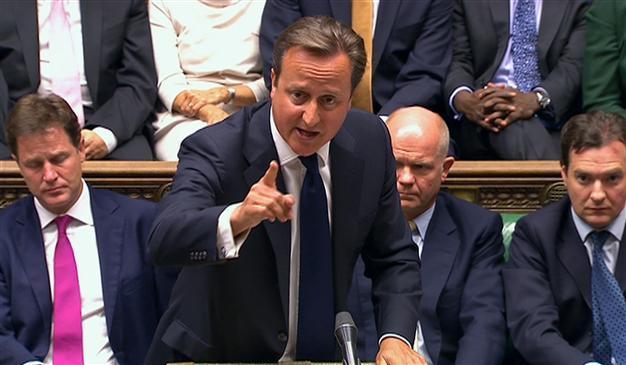British Parliament votes against possible military action in Syria
LONDON - Agence France-Presse

Britain's Prime Minister David Cameron is seen addressing the House of Commons in this still image taken from video in London Aug. 29. REUTERS photo
The British Parliament has voted against a possible military action targeting Syria on Aug. 29 with 285 votes to 272.British Prime Minister David Cameron acknowledged that it was clear the British Parliament does not want a military action in Syria. "I will act accordingly," Cameron said pledging not to override the Parliament.
Prior to the vote, Cameron told parliament on Aug. 29 that he was convinced the Syrian regime was behind a chemical weapons attack, but admitted there was no "100-percent certainty."
Opening a debate in the specially recalled House of Commons, Cameron told lawmakers that they had to "make a judgment."
"The question before the house today is how to respond to one of the most abhorrent uses of chemical weapons in a century, slaughtering innocent men, women and children in Syria," Cameron said.
"It's not about taking sides in the conflict, it's not about invading, it's not about regime change or indeed working more closely with the opposition.
"It's about the large-scale use of chemical weapons and our response to a war crime - nothing else." The Commons is debating a motion from the Conservative-Liberal Democrat coalition government, but due to resistance from the opposition Labour Party it has been watered down and now states that Britain would not take military action against the Syrian regime before United Nations inspectors report back on any evidence of chemical weapons attacks.
The opposition Labour Party are set to vote against the motion, with leader Ed Miliband making his case on the Commons floor.
"We have been having increasing doubts about the opaque nature of the government's motion. It does not mention anything about compelling evidence," a senior party source said.
Cameron told lawmakers: "In the end, there is no 100-percent certainty about who is responsible. You have to make a judgment.
"There is also no 100-percent certainty about what path of action might succeed or fail. "But I think we can be as certain as possible that when we have a regime that has used chemical weapons on 14 occasions, that is most likely responsible for this large scale attack, that if nothing is done it will conclude that it can use these weapons again and again and on a larger scale and with impunity."
Britain can launch military action 'without UN mandate'
Muddying the waters, the government also said it had received legal advice that under international law, Britain could still launch military action even without a mandate from the U.N. Security Council.
Miliband is pushing ahead with his own amendment that calls for a greater U.N. role before any military action is authorised, and has not said whether the party will support the government if that is rejected.
Haunted by their experience of the war in Iraq, a growing number of MPs - including some Conservatives - are reluctant to back British military involvement.
In 2003, parliament gave Labour's then prime minister Tony Blair a mandate to join the U.S.-led offensive in Iraq on the basis of allegations that dictator Saddam Hussein had weapons of mass destruction.
The weapons never materialised and Britain became embroiled in the war for years.
Public opinion in Britain is against missile strikes. A YouGov poll for The Times found that support for firing missiles against military sites in Syria had dropped on Aug. 28 to 22 percent, from 25 percent on Aug. 27, while opposition grew from 50 percent to 51 percent.
















